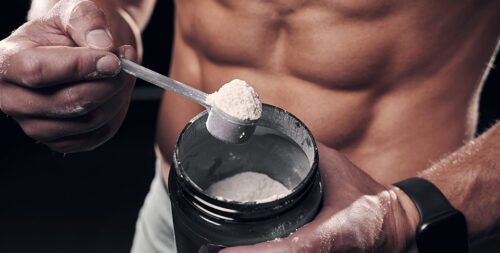Does Creatine Make You Gain Weight? The Truth
Creatine is a popular supplement among athletes and bodybuilders. It is widely used to increase muscle mass, endurance, and strength. However, many people are concerned about the potential side effects of creatine, including weight gain. In this article, we will explore the question “does creatine make you gain weight?” and provide expert tips on taking creatine properly to avoid weight gain.
We will also include some tips on how to use creatine for weight gain, if this is your objective.
Key takeaways:
- Does creatine make you gain weight? Sort of.
- It can increase your water retention rate, thus increasing your water weight
- Creatine can also help you improve your workouts and help you build muscle mass (lean weight)
- If you stop taking creatine the water retention will be reversed
- Creatine won’t cause you gain weight if you don’t eat enough or workout
How Does Creatine Work?
Before we dive deeper into weight gain and creatine is important to understand what creatine is and how it works.
Creatine is a natural substance that is found in the muscles. The body uses creatine to produce energy during exercise, particularly during high-intensity activities like weightlifting and sprinting.
When you supplement with creatine, you increase the amount of creatine stored in your muscles, which allows you to produce more energy during exercise.
Does Creatine Make You Gain Weight?
In short, yes.
Creatine CAN make you gain weight.
However, it is important to understand HOW it does so.
Primarily it can happen in two ways:
- Water retention.
- Induced by caloric surplus plus creatine supplementation.
Does Creatine Make You Gain Water Weight?
Yes, creatine can cause water weight gain. When you first start taking creatine, you may notice an increase in water weight. This is because creatine causes your muscles to retain water. The water weight gain can be as much as 5-10 pounds in the first week of supplementation.
However, this initial weight gain is temporary and will disappear once you stop taking creatine.
Furthermore, weight fluctuations in short periods are very common. Use longer time periods 5-7 days to assess weight gain.
Why Does Creatine Make You Gain Weight? Calorie Surplus and Exercise
Creatine also makes you gain weight because it increases your muscle mass.
When you supplement with creatine, your muscles are able to produce more energy during exercise, which allows you to lift heavier weights and do more reps. This increased workload on your muscles leads to muscle growth, which in turn causes weight gain.
You can add a pre-workout to increase the energy levels and the efficiency of each workout for better results.
Nevertheless, in order to achieve this, you will have to be on a caloric surplus and ensure that you are eating enough protein. If you fail to do so, you won’t see the benefits of taking creatine.
Does Creatine Make You Gain Weight If You Don’t Workout?
No, creatine will not cause weight gain if you don’t workout. Creatine works by increasing your muscle mass, which means that it only causes weight gain if you are working out and building muscle. If you are not working out, creatine will not cause weight gain.
How Much Weight Does Creatine Make You Gain?
The amount of weight you gain from creatine depends on several factors, including your body composition, dosage, and workout routine.
On average, you can expect to gain 2-4 pounds of muscle mass in the first month of creatine supplementation. However, this weight gain may be offset by water weight loss.
For further weight gain, you will need a healthy and balanced diet. Men might also want to use natural testosterone boosters to increase weight.
How to Take Creatine Properly
To take creatine properly and avoid weight gain, follow these tips:
- Start with a loading dose: Take 20 grams of creatine per day for 5-7 days to saturate your muscles with creatine.
- Maintain with a maintenance dose: After the loading phase, take 3-5 grams of creatine per day to maintain your creatine stores.
- Take creatine with a carbohydrate-rich meal: This will help your body absorb the creatine more efficiently.
- Drink plenty of water: Creatine can cause dehydration, so it’s important to drink plenty of water when you are taking creatine.
Make sure that the creatine that you are using is not expired, as this could cause some stomach issues.
Avoiding Dehydration When Taking Creatine
Creatine can cause dehydration, so it’s important to drink plenty of water when you are taking creatine. Aim to drink at least 8-10 glasses of water per day to stay hydrated. You may also want to avoid alcohol and caffeine, as these can further dehydrate you.

Common FAQs About Creatine
Are there any side effects of taking creatine?
Creatine is generally safe when taken as directed. However, some people may experience side effects like diarrhea, upset stomach, or muscle cramps.
How long does it take to see results from creatine?
You can expect to see results from creatine in as little as 2-4 weeks. However, it may take up to 12 weeks to see significant improvements in muscle mass and strength.
Is it safe to take creatine if I have kidney problems?
If you have kidney problems, you should consult with your doctor before taking creatine.
Can You Take Creatine and Avoid Weight Gain?
Yes, if you are not eating enough calories and you are in a calorie deficit, you will still lose weight.
Conclusion – Does Creatine Make You Gain Weight? Sort of…
In conclusion, creatine can cause weight gain due to increased muscle mass and water retention.
However, if you take creatine properly and follow the recommended dosage, you can avoid weight gain and enjoy the benefits of increased muscle mass, endurance, and strength.
Furthermore, when you stop taking creatine you will lose some weight due to reducing the water retention. However, if you are looking to gain weight and you have been eating high-calorie meals to achieve a caloric surplus, you will still benefit from taking creatine.
Ultimately, whether you gain weight or not it won’t depend on creatine, but the amount of calories you consume.

